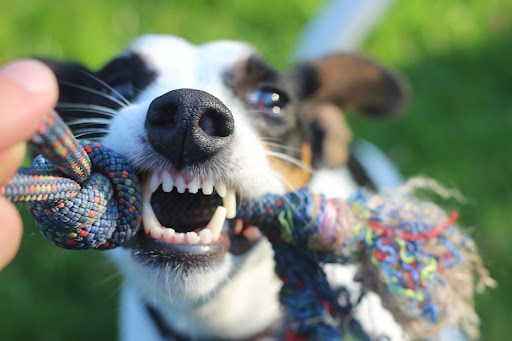Does your dog have dragon breath? Your pet’s puppy breath could be a sign of an underlying issue that warrants prompt veterinary attention.
Typically, foul-smelling breath is a symptom of oral and dental hygiene problems; for instance, it may be an indication of progressive periodontal or gum disease. Bleeding gums, swelling, behavioral changes, and bad breath are signs of a painful oral disease and medical condition.
When left untreated, this can cause your pet considerable discomfort, difficulty with eating, infection, and tooth loss. Consult with your vet provider to learn more.
Dealing with your dog’s dragon breath? Keep your pet’s teeth pearly white with these tips:
Brush your Dog’s Teeth Daily
You may be able to avoid the pain and cost of pet dental problems if you are vigilant about brushing- but how do you go about it? Depending on your dog, it may be easy to acclimatize them to brushing though it requires patience and consistency.
Some tips to help your pup maintain clean teeth include:
- Aim to brush your dog’s teeth at least a couple times per week. The more often you brush, the less risk of your pet contracting a painful oral or dental problem. Ideally, owners try to brush their pet’s teeth every or every other day.
- Acclimate your dog to the process gradually and start as soon as possible.
- Only use toothpastes and toothbrushes that are made for dogs. Never use human products on a pet- it could be toxic.
- If a brush doesn’t seem to work well for you, consider one of the brushing aids that you slip on your finger. This may also be a useful implement when starting out, to familiarize your pet with the process.
- Maintain a relaxing and calm environment during oral care and brushing time. Keep distractions to a minimum.
- Give your pets lots of praise while brushing. Be gentle and work slowly to avoid accidentally hurting your dog.
- Consider calming an anxious pet first with products containing cbd oil for dogs. These products have been shown to help soothe and comfort nervous pets.
Regular brushing also provides you with the opportunity to assess your pet’s mouth for any signs of a problem, like broken teeth, decay, sores- anything that looks out of the ordinary. Report any findings to your veterinary provider.
Consider Some Brushing Alternatives
If brushing is simply out of the question, there are some alternatives including dog dental wipes that can wipe away plaque and prevent tartar from building. While brushing provides better access in and around teeth, wipes may be the next best thing for some pets. These wipes are also prudent to keep on-hand for freshening your dog’s dragon breath between brushings.
Give Treats that are Good for Teeth
Taking care of your pet’s teeth doesn’t always have to seem like a chore; consider dental-friendly dog treats! Chewable dental dog treats can remove and reduce plaque and tartar, from the gnawing and chewing involved. Often times, manufacturers add freshening agents and ingredients so you can also alleviate dragon breath, too, leaving your pet with much fresher puppy breath. Plus, dogs are occupied and engaged with the treat, which can prevent problematic boredom behaviors.
Some meat chews contain ingredients that improve overall dental health, like cow ears and chicken strips. If you are limiting your pet’s snacks, consider nylon chew toys that are rugged and durable, and that basically fulfill the same goal of reducing plaque and preventing decay.
Feed Your Pets Right
Talk with your veterinarian about the best foods and dietary recommendations for your dog. Every breed and dog are distinctive- what is good for one may not be for others. Ask about dry formulas that can help clean teeth and control tartar. Provide pets with plenty of fresh water and limit human treats that you provide to your pet, as often these are the foods that create the most plaque and subsequent problems.
See a Veterinarian for Regular Cleanings
Brushing does not replace regular veterinary visits and professional cleanings. Some pets may require periodic cleanings to get in the back and between teeth, particularly if they are not cooperative with brushing at home. Some pets may require anesthesia for cleanings; talk to your vet to find out more. Remember that dental health is closely tied to holistic wellbeing so do not let your dog’s dental issues go untreated. Typically, a vet will evaluate your dog’s mouth and teeth at routine wellness exams, recommended at least once a year.
Consider CBD Oil
As mentioned, using a CBD oil product formulated for dogs can help calm and soothe a nervous pet. But it can also provide other advantages for your canine companion.
According to the American Kennel Club, some of CBD’s benefits for dogs include:
- Pain relief and management
- Seizure prevention and control
- Reduce inflammation
- Good heart health
- Alleviates nausea and vomiting
- Lowers anxiety and nervousness
Many of the perks of CBD oil for your pet echo the same advantages that Cannabidiol provides for people, too. Make sure that you only use cbd oil for dogs and never products that are formulated for humans.
Use these tips to maintain good oral hygiene and reduce your pet’s risk of painful cavities and potential tooth loss. Call or visit your veterinary provider to find out more.


